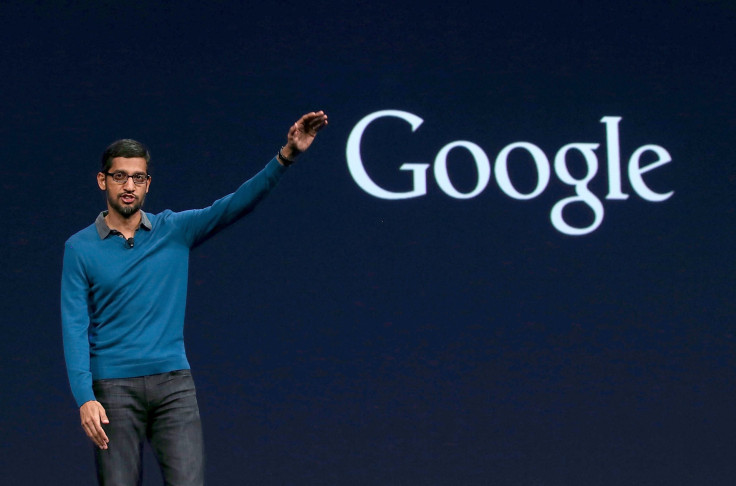Google Alphabet Shakeup Makes Search Giant A 'Venture Capital Firm In Warren Buffett's Clothing'

Google’s surprise move this week to restructure under a holding company called Alphabet Inc. has largely been viewed as a positive on Wall Street. But although the tech giant’s new look is drawing comparisons to billionaire investor Warren Buffett and his successful Berkshire Hathaway empire, there are major differences in how the two conglomerates invest. Indeed, Alphabet, which creates an accounting silo around Google’s core search business, may in part have been a response to investor concerns that the company is pouring more and more of its cash into risky ventures that may not pay off for years, if ever.
Google said it will formally adopt the new reporting structure, starting with its fourth-quarter earnings later this year. The company named Larry Page as CEO of Alphabet, Sergey Brin as president and Eric Schmidt as executive chairman. Senior Products VP Sundar Pichai will become CEO of the core Google search business.
Buffett has long been an influence on how business is done at Google’s Mountain View, California, headquarters. The company said in its IPO letter to shareholders in 2004 that it was inspired by the Oracle of Omaha’s essays from his annual reports to Berkshire shareholders. However, there are key differences between Google co-founders Larry Page and Sergey Brin, and Buffett and his second-in-command, 91-year-old Charlie Munger. For starters, Buffett doesn’t buy companies that are starting from scratch, is generally risk averse, and seeks broad diversification in his holdings.
Investors seldom question whether Buffett’s investments will succeed, given his focus on well-managed companies with strong cash positions. That sort of thinking drove his $37 billion acquisition -- Buffett’s largest ever -- of aircraft parts maker Precision Castparts this week. “It’s not about whether one of Buffett’s investments will disappear in a few years,” said Michael Schwerdtfeger, managing partner at Chapman Associates.
Google, on the other hand, is pouring cash into early-stage startups and so-called moon shots, like driverless cars and the Internet of Things. Alphabet is “a venture capital firm in Warren Buffet’s clothing,” said Phil Davis, founder of PSW investments.
The holding company will work like this: Google will funnel some of the profits generated by its core search business into speculative projects managed by Alphabet. Risky ventures like Calico, which modestly aims to extend the human lifespan, will by contrast put Google under greater Wall Street scrutiny. That’s not to say Alphabet won’t be wildly successful, but it will be assuming more risk than what’s typically found in Buffett’s portfolio. “What Larry Paige and Sergey Brin are doing is very typical Silicon Valley investing. They throw money at ideas and hope one of them turns out well,” Davis said.
Overall, Wall Street says Google’s new corporate structure is a positive for investors because it will generate more transparency and a better understanding of how the company’s noncore business ventures are performing. Victor Anthony, analyst at Axiom Capital, points out the move will endow the investments they’re making in moon shots like Google Fiber and the Nest home-automation offering with more visibility.
“They’re essentially segmented into two businesses and will provide more clarity for investors who either like to value the stock based on some of the noncore parts or assign higher multiples to the core business,” Anthony said, noting that currently investors and analysts had to estimate the value of the noncore businesses. Rick Summer, an analyst at Morningstar, agrees and said the reorganization could boost Google’s stock price. “The company's lack of transparency has created an overhang on the stock during the past year.”
Searching For Profits
The news could also be a win for Google employees in terms of their own stock holdings. “This also sets up the potential for spinouts that, down the road, could help to better incent key business leaders,” Ben Schachter, analyst at Macquarie Securities, said in a note.
Still, some market watchers warn that the new structure could lead to more resources going toward money-losing initiatives. “It’s an excuse to use Google’s money as their own personal bank account,” Davis said.
Investors should be aware that new businesses and products are unlikely to be as profitable as the desktop search market, at least at first. Among other things, Google will be forced to share some revenues generated by Alphabet projects with other players in the value chain, such as content owners, application developers, and hardware makers, so profit growth may ultimately lag revenue growth over the long run, Summer said in a research note Tuesday.
Google has faced heat from shareholders over a slowdown in earnings growth due to its various non-search projects, such as Fiber, an effort to deploy ultrahigh-speed Internet service in parts of the country, or the secretive Google X, which brought the world the widely maligned Google Glass. “That’s upsetting to an investor who thinks they’re buying a search engine,” Davis said.
Jessica Menton is a writer who covers business and the financial markets. News tips? Email me here. Follow me on Twitter @JessicaMenton.
© Copyright IBTimes 2024. All rights reserved.






















